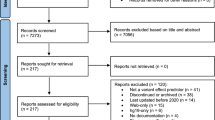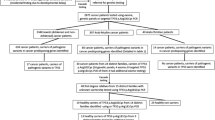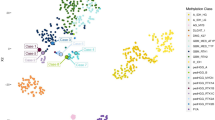Abstract
Many studies have investigated on the association between TP53 Arg72Pro polymorphism and risk of glioma, but the impact of TP53 Arg72Pro polymorphism on glioma risk is unclear owing to the obvious inconsistence among those studies. To shed light on these inconclusive findings and get a quantitative assessment of the association between the TP53 Arg72Pro polymorphism and risk of glioma, we conducted a meta-analysis of eligible studies. We searched PubMed and Embase databases for studies investigating on the association between the TP53 Arg72Pro polymorphism and risk of glioma. The pooled odds ratios (OR) with their 95 % confidence intervals (95 % CI) was calculated to assess the association between the TP53 Arg72Pro polymorphism and risk of glioma. A total of 12 studies were finally included into the meta-analysis. Meta-analysis of the 12 studies showed that TP53 Arg72Pro polymorphism was not associated with the risk of glioma (ORPro vs. Arg = 1.07, 95 % CI 0.93∼1.22; ORProPro vs. ArgArg = 1.02, 95 % CI 0.85∼1.22; ORProPro/ArgPro vs. ArgArg = 1.06, 95 % CI 0.85∼1.34; and ORProPro vs. ArgArg/ArgPro = 1.07, 95 % CI 0.91∼1.27). Subgroup analyses by ethnicity further identified that TP53 Arg72Pro polymorphism was not associated with the risk of glioma in Caucasians. However, there was a mild association between the TP53 Arg72Pro polymorphism and risk of glioma in Asians (ORProPro vs. ArgArg/ArgPro = 1.42, 95 % CI 1.00∼2.02). Thus, there is limited evidence for the association between the TP53 Arg72Pro polymorphism and risk of glioma, and more studies are needed to provide a more comprehensive assessment of the association in Asians.




Similar content being viewed by others
References
Chen J, McKay RM, Parada LF. Malignant glioma: lessons from genomics, mouse models, and stem cells. Cell. 2012;149:36–47.
Goodenberger ML, Jenkins RB. Genetics of adult glioma. Cancer Genet. 2012;205:613–21.
Wang Y, Jiang T. Understanding high grade glioma: molecular mechanism, therapy and comprehensive management. Cancer Lett. 2013;331:139–46.
Marumoto T, Saya H. Molecular biology of glioma. Adv Exp Med Biol. 2012;746:2–11.
Hu M, Shi H, Xu Z, Liu W. Association between epidermal growth factor gene rs4444903 polymorphism and risk of glioma. Tumour Biol. 2013;34:1879–85.
Zhang H, Liu H, Knauss JL. Associations between three XRCC1 polymorphisms and glioma risk: a meta-analysis. Tumour Biol 2013; doi: 10.1007/s13277-013-0865-1
Chipuk JE, Bouchier-Hayes L, Kuwana T, Newmeyer DD, Green DR. PUMA couples the nuclear and cytoplasmic proapoptotic function of p53. Science. 2005;309:1732–5.
Vousden KH, Lane DP. P53 in health and disease. Nat Rev Mol Cell Biol. 2007;8:275–83.
Vogelstein B, Kinzler KW. Cancer genes and the pathways they control. Nat Med. 2004;10:789–99.
Whibley C, Pharoah PD, Hollstein M. P53 polymorphisms: cancer implications. Nat Rev Cancer. 2009;9:95–107.
Dumont P, Leu JI, Della Pietra 3rd AC, George DL, Murphy M. The codon 72 polymorphic variants of p53 have markedly different apoptotic potential. Nat Genet. 2003;33:357–65.
Wang LE, Bondy ML, Shen H, El-Zein R, Aldape K, Cao Y, et al. Polymorphisms of DNA repair genes and risk of glioma. Cancer Res. 2004;64:5560–3.
Malmer B, Feychting M, Lonn S, Ahlbom A, Henriksson R. P53 genotypes and risk of glioma and meningioma. Cancer Epidemiol Biomarkers Prev. 2005;14:2220–3.
Parhar P, Ezer R, Shao Y, Allen JC, Miller DC, Newcomb EW. Possible association of p53 codon 72 polymorphism with susceptibility to adult and pediatric high-grade astrocytomas. Brain Res Mol Brain Res. 2005;137:98–103.
Idbaih A, Boisselier B, Marie Y, El Hallani S, Sanson M, Criniere E, et al. Tp53 codon 72 polymorphism, p53 expression, and 1p/19q status in oligodendroglial tumors. Cancer Genet Cytogenet. 2007;177:103–7.
Malmer BS, Feychting M, Lonn S, Lindstrom S, Gronberg H, Ahlbom A, et al. Genetic variation in p53 and ATM haplotypes and risk of glioma and meningioma. J Neurooncol. 2007;82:229–37.
El Hallani S, Ducray F, Idbaih A, Marie Y, Boisselier B, Colin C, et al. Tp53 codon 72 polymorphism is associated with age at onset of glioblastoma. Neurology. 2009;72:332–6.
Carvalho RM, Pinto GR, Yoshioka FK, Lima PD, Souza CR, Guimaraes AC, et al. Prognostic value of the TP53 Arg72Pro single-nucleotide polymorphism and susceptibility to medulloblastoma in a cohort of Brazilian patients. J Neurooncol. 2012;110:49–57.
Jin T, Zhang J, Li G, Li S, Yang B, Chen C, et al. TP53 and RPA3 gene variations were associated with risk of glioma in a Chinese Han population. Cancer Biother Radiopharm. 2013;28:248–53.
Higgins JP, Thompson SG, Deeks JJ, Altman DG. Measuring inconsistency in meta-analyses. BMJ. 2003;327:557–60.
Mantel N, Haenszel W. Statistical aspects of the analysis of data from retrospective studies of disease. J Natl Cancer Inst. 1959;22:719–48.
DerSimonian R, Laird N. Meta-analysis in clinical trials. Control Clin Trials. 1986;7:177–88.
Stuck AE, Rubenstein LZ, Wieland D. Bias in meta-analysis detected by a simple, graphical test. Asymmetry detected in funnel plot was probably due to true heterogeneity. BMJ. 1998;316:469.
Rajaraman P, Wang SS, Rothman N, Brown MM, Black PM, Fine HA, et al. Polymorphisms in apoptosis and cell cycle control genes and risk of brain tumors in adults. Cancer Epidemiol Biomarkers Prev. 2007;16:1655–61.
Lima-Ramos V, Pacheco-Figueiredo L, Costa S, Pardal F, Silva A, Amorim J, et al. Tp53 codon 72 polymorphism in susceptibility, overall survival, and adjuvant therapy response of gliomas. Cancer Genet Cytogenet. 2008;180:14–9.
Pinto GR, Yoshioka FK, Silva RL, Clara CA, Santos MJ, Almeida JR, et al. Prognostic value of TP53 Pro47Ser and Arg72Pro single nucleotide polymorphisms and the susceptibility to gliomas in individuals from Southeast Brazil. Genet Mol Res. 2008;7:207–16.
Jha P, Pathak P, Chosdol K, Suri V, Sharma MC, Kumar G, et al. TP53 polymorphisms in gliomas from Indian patients: study of codon 72 genotype, rs1642785, rs1800370 and 16 base pair insertion in intron-3. Exp Mol Pathol. 2011;90:167–72.
Francisco G, Menezes PR, Eluf-Neto J, Chammas R. Arg72Pro TP53 polymorphism and cancer susceptibility: a comprehensive meta-analysis of 302 case–control studies. Int J Cancer. 2011;129:920–30.
Zou YF, Wang F, Feng XL. TP53 Arg72Pro polymorphism may have little involvement in the pathogenesis of skin cancer in Caucasians. J Invest Dermatol. 2011;131:781–2.
Conflicts of interest
None
Author information
Authors and Affiliations
Corresponding author
Rights and permissions
About this article
Cite this article
Zhang, F., Li, D., Li, Y. et al. Quantitative assessment of the association between TP53 Arg72Pro polymorphism and risk of glioma. Tumor Biol. 35, 747–751 (2014). https://doi.org/10.1007/s13277-013-1101-8
Received:
Accepted:
Published:
Issue Date:
DOI: https://doi.org/10.1007/s13277-013-1101-8




